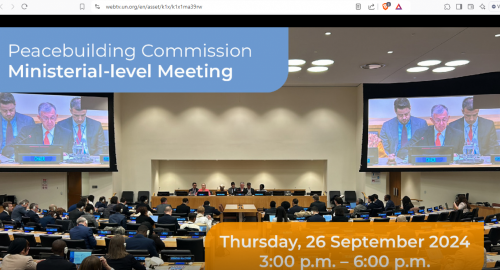
https://www.un.org/peacebuilding/content/about-the-commission
https://teamup.com/4777015/attachment/01J8FJYVPF1FNYJCN0MPCGYWKQ/2024_PB...
The Ministerial-level meeting will take place on Thursday, 26 September, from 3PM to 6PM. All members of the United Nations are invited to participate and to speak for up to three minutes. Delegations that are unable to deliver their statements due to time constraints will have their statements circulated. Availability of interpretation in all UN official languages will be communicated in due course. A list of speakers will be prepared in advance and will be arranged giving priority to PBC members and with due consideration to protocol and order of registration. To facilitate the participation of Ministers, the list of speakers will be shared with Member States in advance of the meeting
Agenda Opening remarks by H.E. Mr. Mauro Luiz Iecker Vieira, Minister for Foreign Affairs of Brazil and Chair of the Peacebuilding Commission Keynote speech by Ms. Rosemary DiCarlo, Under-Secretary-General for Political and Peacebuilding Affairs (DPPA) Briefers H.E. Mr. Danilo Türk, Former President of the Republic of Slovenia, member of the Group of the Independent Eminent Persons to the 2025 Peacebuilding Architecture Review. Professor Funmi Olonisakin, Vice President, International, Engagement and Service (IES) at King’s College London.
The 2025 Peacebuilding Architecture Review presents an opportunity for the international community to assess and improve the United Nations' peacebuilding framework, including by building on the discussions taken place in the Summit of the Future.
Established in 2005, the Peacebuilding Commission (PBC) was designed to support conflict-affected countries by addressing its underlying causes and facilitating long-term recovery. Despite its foundational role in the UN`s peacebuilding efforts, the PBC still faces important challenges in maximizing its impact, working with financial institutions, and effectively bridging gaps between main UN bodies. The international landscape has also become increasingly complex since the PBC`s inception. Modern conflicts are often characterized by intricate socio-political dynamics, increased involvement of non-state actors, and multifaceted humanitarian needs. Furthermore, the financial and logistical support necessary for effective peacebuilding has become more demanding, what highlights the need for more investment in conflict prevention. Against this backdrop, drawing on the presence of world leaders during the General Assembly High Level week, it would be opportune to hold a Ministerial event to discuss and identify priorities for peacebuilding and sustaining peace ahead of the review process.
Mandate
In the resolutions establishing the Peacebuilding Commission, resolution A/RES/60/180 and resolution S/RES/1645 (2005) of 20 December 2005, the United Nations General Assembly and the Security Council mandated it:
- to bring together all relevant actors to marshal resources and to advise on and propose integrated strategies for post-conflict peacebuilding and recovery;
- to focus attention on the reconstruction and institution-building efforts necessary for recovery from conflict and to support the development of integrated strategies in order to lay the foundation for sustainable development;
- to provide recommendations and information to improve the coordination of all relevant actors within and outside the United Nations, to develop best practices, to help to ensure predictable financing for early recovery activities and to extend the period of attention given by the international community to postconflict recovery.
In resolutions A/RES/70/262 and S/RES/2282 (2016), General Assembly and Security Council also stressed the importance of the Peacebuilding Commission to fulfil the following functions in this regard:
- To bring sustained international attention to sustaining peace, and to provide political accompaniment and advocacy to countries affected by conflict, with their consent;
- To promote an integrated, strategic and coherent approach to peacebuilding, noting that security, development and human rights are closely interlinked and mutually reinforcing;
- To serve a bridging role among the principal organs and relevant entities of the United Nations by sharing advice on peacebuilding needs and priorities, in line with the respective competencies and responsibilities of these bodies;
- To serve as a platform to convene all relevant actors within and outside the United Nations, including from Member States, national authorities, United Nations missions and country teams, international, regional and subregional organizations, international financial institutions, civil society, women’s groups, youth organizations and, where relevant, the private sector and national human rights institutions, in order to provide recommendations and information to improve their coordination, to develop and share good practices in peacebuilding, including on institution-building, and to ensure predictable financing to peacebuilding.









